

How Globalists Plan To Use Technology And Poverty To Enslave The Masses. Who Can Spy On Us? A Visual Guide. Comparative Analysis of Surveillance Laws and Practices in Latin America. In December 1992, following a hastily-drawn sketch of a map given to him by a whistleblower, the Paraguayan lawyer Martin Almada drove to an obscure police station in the suburb of Lambaré, near Asunción.
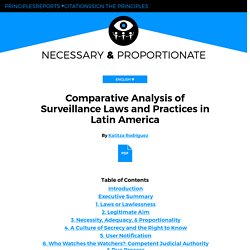
Behind the police offices, in a run-down office building, he discovered a cache of 700,000 documents, piled nearly to the ceiling. This was “the Terror Archive,” an almost complete record of the interrogations, torture, and surveillance conducted by the military dictatorship of Alfredo Stroessner. The files reported details of “Operation Condor,” a clandestine program between the military dictatorships in Argentina, Chile, Paraguay, Bolivia, Uruguay and Brazil between the 1970s and 1980s. The military governments of those nations agreed to cooperate in sending teams into other countries to track, monitor and kill their political opponents. America's Surveillance State (Documentary) Can Americans Resist Surveillance. New Study Shows Mass Surveillance Breeds Meekness, Fear and Self-Censorship.
A newly published study from Oxford’s Jon Penney provides empirical evidence for a key argument long made by privacy advocates: that the mere existence of a surveillance state breeds fear and conformity and stifles free expression.
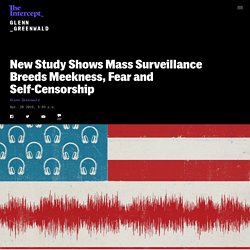
Reporting on the study, the Washington Post this morning described this phenomenon: “If we think that authorities are watching our online actions, we might stop visiting certain websites or not say certain things just to avoid seeming suspicious.” The new study documents how, in the wake of the 2013 Snowden revelations (of which 87 percent of Americans were aware), there was “a 20 percent decline in page views on Wikipedia articles related to terrorism, including those that mentioned ‘al Qaeda,’ ‘car bomb’ or ‘Taliban.'” People were afraid to read articles about those topics because of fear that doing so would bring them under a cloud of suspicion. Silence Effects in the Wake of NSA Internet Monitoring. Edward Snowden. Today, the government is granting itself the power to police every citizen’s private life.
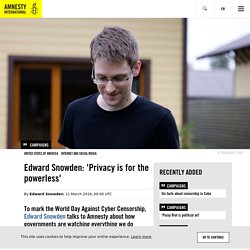
Every man, woman, child, boy, girl. It doesn’t matter who you are, how innocent or not innocent you are, they are watching everything you’re doing. They’re intercepting it, analyzing it and storing it for increasing periods of time. Keys Under Doormats: Mandating insecurity by requiring government access to all data and communications. Former NSA Head Exposes Agency's True Crimes YouTube.
Tips, Tools and How-tos for Safer Online Communications. Mass surveillance exposed by Snowden ‘not justified by fight against terrorism’ The “secret, massive and indiscriminate” surveillance conducted by intelligence services and disclosed by the former US intelligence contractor Edward Snowden cannot be justified by the fight against terrorism, the most senior human rights official in Europe has warned.
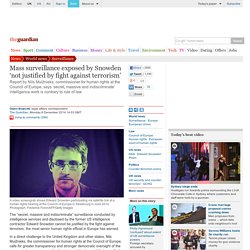
In a direct challenge to the United Kingdom and other states, Nils Muižnieks, the commissioner for human rights at the Council of Europe, calls for greater transparency and stronger democratic oversight of the way security agencies monitor the internet. 'Privacy Critical to Human Freedom': Snowden, Poitras, and Greenwald Talk NSA. During a unique conversation hosted by the New School and the New York Times on Thursday, the three people most responsible for bringing the story of mass global surveillance programs orchestrated by the U.S.
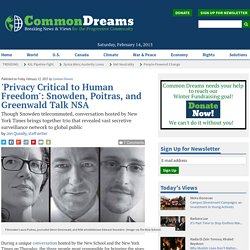
National Security Agency were brought together for the first time since they first met in a Hong Kong hotel in 2013. Filmmaker Laura Poitras and journalist Glenn Greenwald sat with the New York Times media columnist David Carr on stage while the whistleblower himself, Edward Snowden, appeared via videolink from Russia where he remains under asylum protection. They Fight Surveillance - And You Can Too. Call it "privacy nihilism.

" Whether you're reading about the latest security breaches across the Net, or the jaw-dropping details of the latest NSA leak, or you're explaining the importance of crypto to your blank-faced family, or struggling to stop your own government's plans on burning your right to privacy, it's sometimes easy to just throw up your hands in despair and give it all up. What can anyone realistically do when online eavesdropping is increasingly pervasive, and governments and companies seem determined to keep it that way? Australia’s metadata grab will create modern-day Stasi files. Privacy Rights in the Digital Age. Lessons Learned From Don't Spy On Us: Your Guide To Internet Privacy.
With 500 attendees and some big names from the data privacy and human rights fields, the Don’t Spy on Us Day of Action was a fascinating afternoon of discussion, debate, and practical advice on how to keep our personal data private from snooping governments.

I learned a lot, and I’ve condensed the most important parts of what I’ve learned into five main points. I’ve also included five things you can do right now to make a difference, both for yourself and for other internet users. 1. Online Privacy Isn’t Just About Protecting Our Data. History of Spying. Washington’s Blog June 27, 2014 Americans are told that we live in a “post-9/11 reality” that requires mass surveillance.
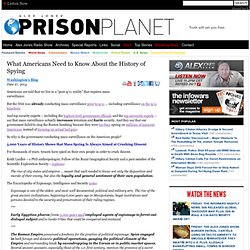
But the NSA was already conducting mass surveillance prior to 9/11 … including surveillance on the 9/11 hijackers. And top security experts – including the highest-level government officials and the top university experts – say that mass surveillance actually increases terrorism and hurts security. And they say that our government failed to stop the Boston bombing because they were too busy spying on millions of innocent Americans instead of focusing on actual bad guys.
Surveillance Privacy Issues. 2013/12/Full-Disclosure.